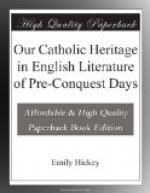In connection with the runes I want to tell you of two old poems, which may be related to each other. One is known as “The Wife’s Complaint,” the other as, “The Husband’s Message.” The first of them is apparently spoken by a woman who laments her hard fate, her husband having gone over the sea, away from her. She is imprisoned in an old earthen dwelling under an oak; she has no friends near, and she tells how vain were the vows of love exchanged between her and her husband. Now the second poem, “The Husband’s Message,” may be written for this wife; we do not know; at any rate it conveys a message from an absent husband to a wife; and I will give it to you as an early love-letter. It consists of two parts, one of which has been thought to be a riddle, but they have been put together by a learned Professor, and if they do belong to each other, the arrangement is as interesting as it is beautiful. The message is given by the letter itself—the slip of bark or wood on which it was carved—and this wood speaks. First it tells us about itself. It had dwelt on the beach near the sea-shore: there were few to behold its home in the solitude, but every morning the brown wave encircled it with a watery embrace. Then it little thought that even, though itself mouthless, it should speak among the mead-drinkers and utter words.
A
great marvel it is,
Strange in the mouth that
knoweth it not,
How the point of the knife
and the right hand,
The thought of a man, and
his blade therewith,
Shaped me with skill, that
boldly I might
So deliver a message to thee
In the presence of us two
alone,
That to other men our talk
May not make it more widely
known.
The letter then tells how it had come in the keeled vessel, and how the lady would now know how in her heart she may think of the love of her lord. “I dare maintain,” says the letter, “that there thou wilt find true loyalty.” He that carved the characters on the wood, bad it pray her, the lady decked with jewels, to remember the vows they twain had often made when they dwelt together in their home in the same land.
Force
drove him
Out of the land. Now
hath he bidden me
Earnestly to urge thee to
sail the sea
When thou hast heard on the
brow of the hill
The mournful cuckoo call in
the wood.
Then let no living man keep
thee
From the journey, or hinder
thy going.
Betake thee to the sea, the
home of the mew,
Seat thee in the boat, that
southward from here
Beyond the road of the sea
thou mayest find the man
Where waits thy prince in
hope of thee.




